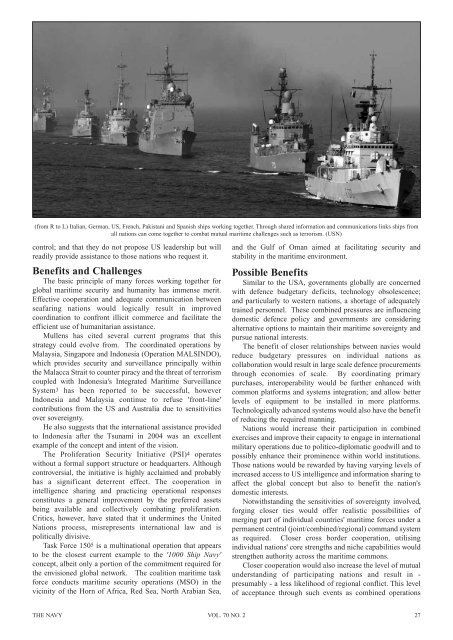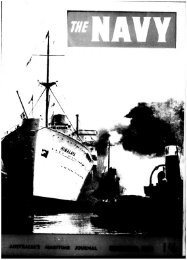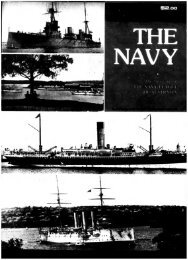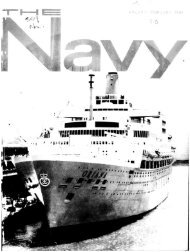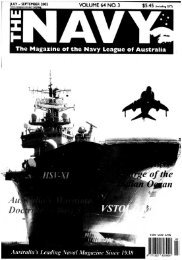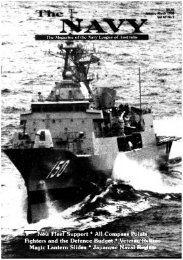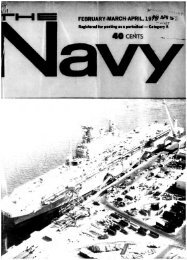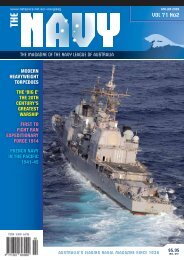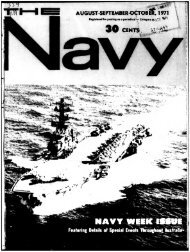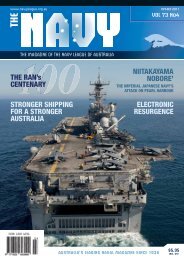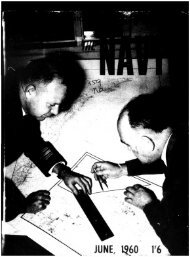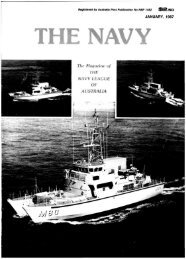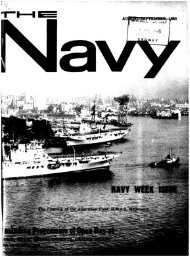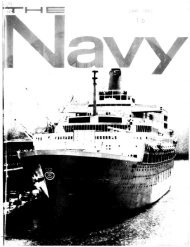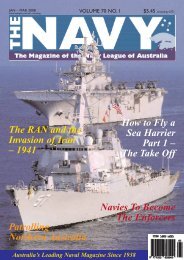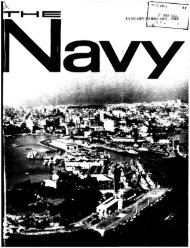The Navy Vol_70_No_2 Apr 2008 - Navy League of Australia
The Navy Vol_70_No_2 Apr 2008 - Navy League of Australia
The Navy Vol_70_No_2 Apr 2008 - Navy League of Australia
You also want an ePaper? Increase the reach of your titles
YUMPU automatically turns print PDFs into web optimized ePapers that Google loves.
(from R to L) Italian, German, US, French, Pakistani and Spanish ships working together. Through shared information and communications links ships from<br />
all nations can come together to combat mutual maritime challenges such as terrorism. (USN)<br />
control; and that they do not propose US leadership but will<br />
readily provide assistance to those nations who request it.<br />
Benefits and Challenges<br />
<strong>The</strong> basic principle <strong>of</strong> many forces working together for<br />
global maritime security and humanity has immense merit.<br />
Effective cooperation and adequate communication between<br />
seafaring nations would logically result in improved<br />
coordination to confront illicit commerce and facilitate the<br />
efficient use <strong>of</strong> humanitarian assistance.<br />
Mullens has cited several current programs that this<br />
strategy could evolve from. <strong>The</strong> coordinated operations by<br />
Malaysia, Singapore and Indonesia (Operation MALSINDO),<br />
which provides security and surveillance principally within<br />
the Malacca Strait to counter piracy and the threat <strong>of</strong> terrorism<br />
coupled with Indonesia's Integrated Maritime Surveillance<br />
System3 has been reported to be successful, however<br />
Indonesia and Malaysia continue to refuse 'front-line'<br />
contributions from the US and <strong>Australia</strong> due to sensitivities<br />
over sovereignty.<br />
He also suggests that the international assistance provided<br />
to Indonesia after the Tsunami in 2004 was an excellent<br />
example <strong>of</strong> the concept and intent <strong>of</strong> the vision.<br />
<strong>The</strong> Proliferation Security Initiative (PSI)4 operates<br />
without a formal support structure or headquarters. Although<br />
controversial, the initiative is highly acclaimed and probably<br />
has a significant deterrent effect. <strong>The</strong> cooperation in<br />
intelligence sharing and practicing operational responses<br />
constitutes a general improvement by the preferred assets<br />
being available and collectively combating proliferation.<br />
Critics, however, have stated that it undermines the United<br />
Nations process, misrepresents international law and is<br />
politically divisive.<br />
Task Force 1505 is a multinational operation that appears<br />
to be the closest current example to the '1000 Ship <strong>Navy</strong>'<br />
concept, albeit only a portion <strong>of</strong> the commitment required for<br />
the envisioned global network. <strong>The</strong> coalition maritime task<br />
force conducts maritime security operations (MSO) in the<br />
vicinity <strong>of</strong> the Horn <strong>of</strong> Africa, Red Sea, <strong>No</strong>rth Arabian Sea,<br />
and the Gulf <strong>of</strong> Oman aimed at facilitating security and<br />
stability in the maritime environment.<br />
Possible Benefits<br />
Similar to the USA, governments globally are concerned<br />
with defence budgetary deficits, technology obsolescence;<br />
and particularly to western nations, a shortage <strong>of</strong> adequately<br />
trained personnel. <strong>The</strong>se combined pressures are influencing<br />
domestic defence policy and governments are considering<br />
alternative options to maintain their maritime sovereignty and<br />
pursue national interests.<br />
<strong>The</strong> benefit <strong>of</strong> closer relationships between navies would<br />
reduce budgetary pressures on individual nations as<br />
collaboration would result in large scale defence procurements<br />
through economies <strong>of</strong> scale. By coordinating primary<br />
purchases, interoperability would be further enhanced with<br />
common platforms and systems integration; and allow better<br />
levels <strong>of</strong> equipment to be installed in more platforms.<br />
Technologically advanced systems would also have the benefit<br />
<strong>of</strong> reducing the required manning.<br />
Nations would increase their participation in combined<br />
exercises and improve their capacity to engage in international<br />
military operations due to politico-diplomatic goodwill and to<br />
possibly enhance their prominence within world institutions.<br />
Those nations would be rewarded by having varying levels <strong>of</strong><br />
increased access to US intelligence and information sharing to<br />
affect the global concept but also to benefit the nation's<br />
domestic interests.<br />
<strong>No</strong>twithstanding the sensitivities <strong>of</strong> sovereignty involved,<br />
forging closer ties would <strong>of</strong>fer realistic possibilities <strong>of</strong><br />
merging part <strong>of</strong> individual countries' maritime forces under a<br />
permanent central (joint/combined/regional) command system<br />
as required. Closer cross border cooperation, utilising<br />
individual nations' core strengths and niche capabilities would<br />
strengthen authority across the maritime commons.<br />
Closer cooperation would also increase the level <strong>of</strong> mutual<br />
understanding <strong>of</strong> participating nations and result in -<br />
presumably - a less likelihood <strong>of</strong> regional conflict. This level<br />
<strong>of</strong> acceptance through such events as combined operations<br />
THE NAVY VOL. <strong>70</strong> NO. 2 27


